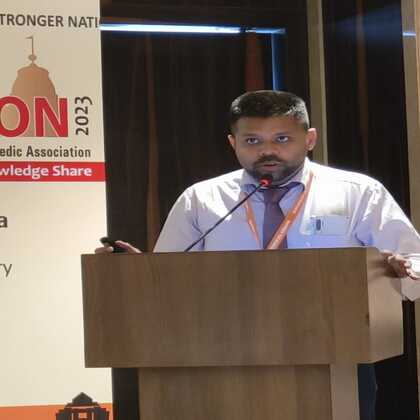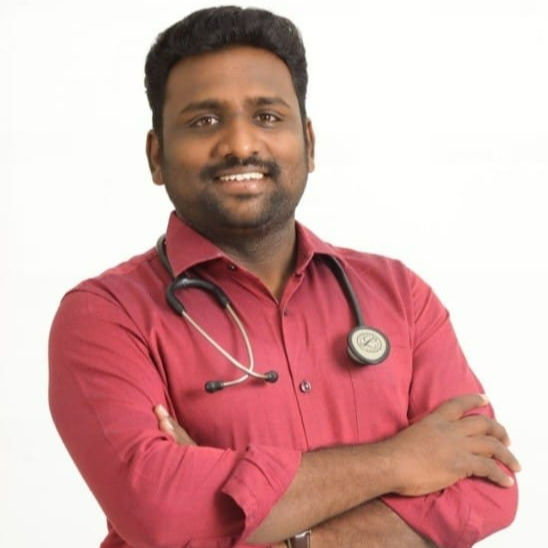Avascular Necrosis Remedies
From non-surgical treatments and surgical options to alternative therapies and rehabilitation strategies—explore effective remedies for avascular necrosis (AVN). Let’s explore all about avascular necrosis remedies for better management.

Written by
Last updated on 3rd Jul, 2025
Bones, as living structures, constantly renew and rebuild themselves through an intricate network of blood vessels—much like a bustling city with its complex system of roads and supply lines.
Avascular necrosis (AVN) affects this vital network, creating a situation where parts of bones begin to struggle due to a lack of healthy blood supply. This condition can specifically impact the joints that bear our body weight and support daily movements. When blood supply diminishes, bone tissue begins to break down, leading to a cascade of changes that can significantly impact quality of life. This process might start silently, but over time, it can lead to noticeable changes in how joints function and feel.
Understanding AVN is essential since early detection can help with timely intervention, leading to better management and treatment.
Causes and Risk Factors
When bones don't receive their regular supply of blood, they begin to weaken, much like a house that's not getting proper maintenance. This process can happen for several reasons:
Physical injuries, like a fall or accident, can damage the delicate blood vessels feeding our bones
Sometimes medications, particularly corticosteroids used for various health conditions, can inadvertently affect bone health
Certain health conditions, such as lupus or sickle cell disease, can make someone more likely to develop AVN
Symptoms of Avascular Necrosis
Here are some symptoms that can potentially help diagnose AVN.
1. Early Warning Signs
The body has its own way of raising red flags when AVN develops. Initially, these signals might be subtle—a slight discomfort here, a bit of stiffness there. As time progresses, these whispers often turn into more urgent messages. Early stages:
Mild discomfort that comes and goes
Slight stiffness in the morning that improves with movement
Occasional catching or clicking sensations in the joint
2. Advanced Warning Signs
Persistent pain that interferes with sleep
Difficulty with previously simple tasks like climbing stairs
Noticeable changes in walking pattern or posture
Reduced range of motion that affects daily activities
Consult Top Doctors For Avascular Necrosis
Diagnosis of Avascular Necrosis
Modern medicine has given healthcare providers powerful tools to peek inside the body and understand what's happening to the bones. Healthcare teams typically begin with a careful physical examination, much like detectives gathering initial clues. They'll look at how joints move, where pain occurs, and what activities become challenging:
X-rays act like a first snapshot, showing the overall bone structure
MRI scans provide a more detailed story, revealing early changes in blood flow and tiny breaks in the bone that might not be visible on regular X-rays
Non-Surgical Treatment Options
The journey to managing AVN often begins with gentle, non-surgical methods that aim to support the body's natural healing processes:
Pain-relieving medications work like a temporary shield, helping to manage discomfort while other treatments take effect
Specialised bone-strengthening medications can help fortify weakened areas
For some people, blood-thinning medications help ensure better circulation to affected areas
Physical therapy also plays a crucial role, teaching the body how to:
Build strength without overtaxing damaged areas
Maintain flexibility through gentle, purposeful movements
Find alternative ways to perform daily activities that protect vulnerable joints
Surgical Treatment Options
When conservative treatments aren't enough, surgical options offer hope for lasting relief:
1. Minimally Invasive Techniques
Core decompression surgery works like creating new pathways for blood flow, similar to building emergency roads to bypass traffic jams. This approach works best when AVN is caught early.
2. Reconstructive Procedures
In cases where bone damage is more extensive, surgeons can reshape the bone (osteotomy) to redistribute weight to healthier areas, or, in advanced cases, replace the entire joint with artificial components designed to restore normal movement.
Alternative and Home Remedies
The food we eat plays a vital role in bone health:
Calcium-rich foods serve as building blocks for strong bones
Vitamin D helps the body make the most of available calcium
Anti-inflammatory foods like fatty fish and nuts can help support overall joint health
Additional support can also come from various sources:
Natural supplements that support joint health
Ancient practices like acupuncture that may help with pain management
Gentle massage techniques that promote better circulation
Rehabilitation and Recovery
Recovery from surgical procedures requires patience and dedication:
Progressive physical therapy helps rebuild strength and confidence
Careful activity planning prevents overtaxing healing tissues
Support devices provide stability during the healing process
Managing AVN is often a marathon, not a sprint:
Regular check-ups help track progress and catch any concerns early
Lifestyle adjustments support long-term joint health
Building a support network helps navigate both physical and emotional challenges
Prevention Strategies
While not all cases of AVN can be prevented, certain steps can help reduce risks:
Maintaining healthy habits that support good circulation
Managing underlying health conditions effectively
Taking precautions to prevent joint injuries
Staying vigilant about bone health involves:
Regular health screenings to catch potential issues early
Prompt attention to any new joint symptoms
Ongoing communication with healthcare providers
Managing life with AVN requires adaptation and resilience, and the following strategies are generally adopted:
Creating an environment that supports joint health through ergonomic adjustments
Finding joy in modified activities that don't strain affected joints
Building connections with others who understand similar challenges
Prognosis and Long-Term Outlook
The prognosis of avascular necrosis (AVN) depends largely on the stage at which it is diagnosed, the effectiveness of treatment, and individual factors such as overall health and the specific joint affected. Early detection and intervention are crucial in preserving bone structure and joint functionality. While the condition is progressive, appropriate management can slow its advancement, alleviate symptoms, and, in some cases, prevent severe complications.
Without timely and effective treatment, AVN can lead to significant complications that impact mobility and quality of life.
Ongoing research in the field of avascular necrosis is steadily improving treatment options and outcomes. Advances in imaging technologies, such as dynamic MRI techniques, are enhancing early diagnosis, allowing for more targeted interventions. Biologic therapies, including stem cell treatments, show promise in regenerating damaged bone tissue and improving vascularisation, particularly in early-stage AVN.
Conclusion
Living with AVN requires understanding, patience, and a proactive approach to joint health. While it presents significant challenges, modern medicine offers numerous ways to manage symptoms and maintain quality of life. The key lies in early recognition and appropriate intervention, supported by a comprehensive treatment plan that addresses both physical and quality-of-life concerns.
Working closely with healthcare providers, staying informed about treatment options, and maintaining a positive outlook are essential elements of successfully managing AVN. Remember, each person's journey with AVN is unique, and treatment plans should be tailored to individual needs and circumstances.
Consult Top Orthopaedician
Consult Top Doctors For Avascular Necrosis
Dr. Anil Sharma
Orthopaedician
42 Years • MBBS, MS Orthopedics
New Delhi
AAKASH MEDSQUARE, New Delhi

Dr. Sourav Kumar Pal
Orthopaedician
3 Years • MBBS, MS(ORTHO)
Malda
B S ORTHO, Malda

Dr. Manoj Dinkar
Orthopaedician
15 Years • MBBS, Dip (Orthopaedics)
New Delhi
THE DOCTORS NESST, New Delhi

Dr. Mriganka Ghosh
Orthopaedician
11 Years • MD (Physician), DNB (Orthopaedics)
Howrah
Dr Mriganka Mouli Ghosh, Howrah

Dr. Pradeep Lucas
Orthopaedician
7 Years • MBBS, Diploma in Orthopaedics, Fellowship in DFSI
Bengaluru
Revival Multispeciality Clinic, Bengaluru
Consult Top Orthopaedician
Dr. Anil Sharma
Orthopaedician
42 Years • MBBS, MS Orthopedics
New Delhi
AAKASH MEDSQUARE, New Delhi

Dr. Sourav Kumar Pal
Orthopaedician
3 Years • MBBS, MS(ORTHO)
Malda
B S ORTHO, Malda

Dr. Manoj Dinkar
Orthopaedician
15 Years • MBBS, Dip (Orthopaedics)
New Delhi
THE DOCTORS NESST, New Delhi

Dr. Mriganka Ghosh
Orthopaedician
11 Years • MD (Physician), DNB (Orthopaedics)
Howrah
Dr Mriganka Mouli Ghosh, Howrah

Dr. Pradeep Lucas
Orthopaedician
7 Years • MBBS, Diploma in Orthopaedics, Fellowship in DFSI
Bengaluru
Revival Multispeciality Clinic, Bengaluru
